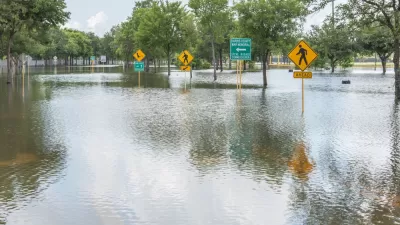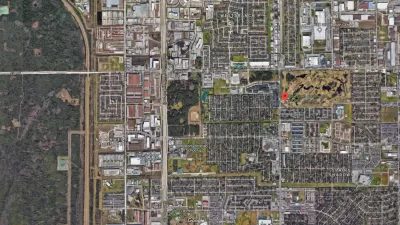A new Flood Resilience Trust will create a permanent source of funding for flood control purposes, but the county still faces a shortfall for planned projects.

Harris County, Texas, home to Houston, "will unveil a new plan to address a funding gap for its flood bond program, which will rely more heavily on diverted toll road revenue instead of federal aid that may never arrive." The county's Commissioners Court also plans to "approve a new, permanent fund for flood control purposes and give priority to the most vulnerable areas to receive aid from it." The plan also comes on the heels of analysis that shows a disparity in funding: ""In March, the county announced that some of the watersheds with the wealthiest communities, such as White Oak and Buffalo bayous, had their projects close to fully funded." Meanwhile, "[w]atersheds with some of the county’s poorest neighborhoods, such as Halls and Greens bayous, had less than half the necessary dollars," reports Zach Despart in the Houston Chronicle.
"The revised strategy sprang from county officials’ realization this year that the original bond plan is not working. Voters in 2018 passed the $2.5 billion bond, though the county planned about $5 billion in mitigation projects — such as detention basins, buyouts and channel improvements — while anticipating federal matching dollars would pay for the rest." The new fund, known as the Flood Resilience Trust, "would direct Harris County Toll Road Authority revenue — a lump sum of $230 million plus $40 million annually — to a new Flood Resilience Trust. This account would be used to plug funding holes in projects where federal aid failed to arrive." But as Despart writes, "[t]he plan still leaves approved projects $950 million short, however, raising the possibility that a new bond or flood control tax increases may be needed in the future to pay for all planned projects, according to budget office documents."
FULL STORY: Harris County plans to use toll road money fixes flood bond funding problem - for now

Maui's Vacation Rental Debate Turns Ugly
Verbal attacks, misinformation campaigns and fistfights plague a high-stakes debate to convert thousands of vacation rentals into long-term housing.

Planetizen Federal Action Tracker
A weekly monitor of how Trump’s orders and actions are impacting planners and planning in America.

In Urban Planning, AI Prompting Could be the New Design Thinking
Creativity has long been key to great urban design. What if we see AI as our new creative partner?

King County Supportive Housing Program Offers Hope for Unhoused Residents
The county is taking a ‘Housing First’ approach that prioritizes getting people into housing, then offering wraparound supportive services.

Researchers Use AI to Get Clearer Picture of US Housing
Analysts are using artificial intelligence to supercharge their research by allowing them to comb through data faster. Though these AI tools can be error prone, they save time and housing researchers are optimistic about the future.

Making Shared Micromobility More Inclusive
Cities and shared mobility system operators can do more to include people with disabilities in planning and operations, per a new report.
Urban Design for Planners 1: Software Tools
This six-course series explores essential urban design concepts using open source software and equips planners with the tools they need to participate fully in the urban design process.
Planning for Universal Design
Learn the tools for implementing Universal Design in planning regulations.
planning NEXT
Appalachian Highlands Housing Partners
Mpact (founded as Rail~Volution)
City of Camden Redevelopment Agency
City of Astoria
City of Portland
City of Laramie





























